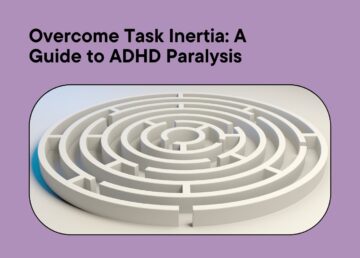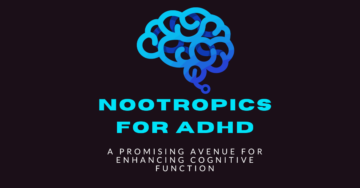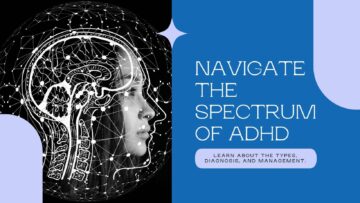
In today’s fast-paced world, a laser-sharp focus is valuable for personal and professional success. However, for individuals living with Attention Deficit Hyperactivity Disorder (ADHD), staying focused can be particularly daunting, not to mention impacting their overall mental health.
Managing focus is pivotal for both professional and personal success. Maintaining attention is crucial in the workplace for productivity, meeting deadlines, and delivering high-quality work.
At the same time, a lack of focus in personal life can complicate relationships, decrease organization, and lead to general dissatisfaction with life.
In this blog post, we will explore how to navigate the complexities of focusing with ADHD and share 12 practical strategies for improved attention and productivity.
In this article
How ADHD Impacts Focus
ADHD, a neurodevelopmental brain disorder, affects millions of people worldwide, affecting their ability to focus, organize, and manage tasks effectively.
According to a study published in the Journal of Global Health, more than 300,000 adults worldwide were diagnosed with adult ADHD in 2020.
In fact, maintaining focus is one of the core symptoms of ADHD.
While ADHD is commonly associated with children, it can persist into adulthood, affecting various aspects of daily life. It is essential to recognize that ADHD is not a result of laziness or lack of intelligence but is rooted in neurobiological differences that affect cognitive functioning.
Strategies to Improve Focus Now
When it comes to managing ADHD symptoms and improving focus, having a collection of both short- and long-term strategies is essential.
While immediate strategies can provide quick relief and boost productivity at a given moment, long-term strategies offer a foundation for sustained focus and attention. In other words, changing habits can help train your “attention muscles.”
Tip 1: Use timers and breaks
Time blindness is one of the most common ADHD symptoms – it affects how you perceive time, as well as how much you believe you can complete in a given amount of time. An effective short-term strategy for enhancing focus with ADHD is utilizing timers and breaks.
Setting a timer for designated work periods allows focused attention on tasks while providing a sense of urgency and structure.
By breaking work or study sessions into manageable intervals, such as 25 minutes of focused work followed by a 5-minute break (known as the Pomodoro technique), people with ADHD can maintain motivation and prevent burnout. These short breaks provide an opportunity to recharge, engage in brief physical activity, or relax the mind before returning to the task at hand.
Tip 2: Create a distraction-free environment
Minimizing external stimuli and creating a dedicated workspace free from distractions can significantly enhance concentration and productivity.
Investing in a pair of noise-canceling headphones, clearing clutter, organizing materials, and ensuring a comfortable, well-lit space can promote a focused mindset.
Additionally, removing digital distractions, such as turning off notifications or using website blockers, and using time blocking on your calendar to stay undisturbed help limit the temptation to divert attention.
Juggling several projects and multitasking can make it hard to stay concentrated. Limit distractions at work by carrying out one task at a time. Concentrating on a single task can put you in focus mode.
Some individuals with ADHD find that they actually can focus better in environments where they can periodically shift their attention. If this sounds like you, consider trying to study or work in a coffee shop instead of a quiet library, and see how it feels. It can be helpful to experiment with a variety of environments and see which ones suit you best.
Tip 3: Exercise regularly
Exercise is a powerful tool for enhancing focus and managing ADHD symptoms. Regularly engaging in physical activity releases endorphins, which are natural mood boosters and can improve attention and motivation – the main elements needed to complete a task.
Whether it’s a brisk walk, a bike ride, or a workout at the gym, incorporating regular exercise into your routine can profoundly impact your ability to maintain focus and concentration.
Exercise benefits the brain, helps regulate energy levels, and improves overall well-being. It can reduce stress and anxiety, which are common challenges in adult ADHD. Exercise can also help improve sleep, which is also beneficial for individuals living with ADHD.
Tip 4: Set reminders for yourself
Time blocking and setting reminders can improve concentration and productivity for people with ADHD.
Setting reminders is essential to time blocking and helps keep you on track throughout the day. Make yourself visual reminders, such as a to-do list in your notebook, and use digital tools like calendars, task management apps, or even simple alarms on your phone to remind yourself of an upcoming task.
Setting automatic reminders for essential tasks on your calendar or notes app can help you stay on top of your assignments without extra work.
Tip 5: Get an accountability buddy
An accountability buddy supports and encourages you in achieving your goals, holds you accountable for your commitments, provides support, and helps keep you on track.
Choose a trusted friend, family member, or colleague, share your goals and deadlines with them, and establish a system of regular check-ins or progress updates. This accountability partnership creates a sense of responsibility. It eliminates the option of getting distracted.
If you feel comfortable, you can also tell them you’re learning how to focus with ADHD and ask them to support you. This way, you’ll feel more inclined to complete tasks.
Tip 6: Set small goals
Instead of overwhelming yourself with large assignments, break tasks into smaller, more manageable chunks. Start by identifying the ultimate objective, divide it into multiple assignments, and work on one task at a time.
ADHD can make it difficult to sustain attention for prolonged periods, especially on information that isn’t particularly novel, exciting, or relevant.
Since all work won’t always be novel, exciting, or urgent, we often need to find workarounds to get the work completed. Setting small, accomplishable goals at least leads to a manageable workload, and a sense of accomplishment. This can then motivate us to continue working on the next task.
Tip 7: Know when to stop
If you find yourself losing focus, don’t hesitate to politely walk away. It’s better to take a short break than to miss important details in a conversation or make errors.
If you’re talking to someone and have trouble staying focused, kindly tell them, “Sorry, can we get back to this in a few minutes? I just need to take a short break and will then get back to you with my full attention.”
But that’s not to say that individuals with ADHD can’t stay focused – over-focusing also happens. ADHD can result in hyperfocus, where individuals can find themselves unable to tear themselves from a fascinating book or cool new video game.
While exclusively focusing on a task or activity can be helpful sometimes, it can lead to missing out on completing a tedious project or task. For this reason, knowing when to take a step back is vital.
Building long-term habits for sustained focus
Developing long-term habits is vital to improving focus for people with ADHD. These habits create a solid foundation that supports consistent attention and helps navigate the challenges often accompanying ADHD.
Moreover, habits promote better mental health in general and help lead a healthy lifestyle.
Tip 8: Implement a consistent sleep schedule
Poor or inconsistent sleeping schedules can cause difficulty sleeping or falling asleep. Therefore, lack of sleep and poor sleep quality can contribute to difficulty focusing.
Lack of sleep can significantly impact attention, impulse control, and overall cognitive function. By prioritizing sleep quality, you can boost mental clarity and enhance your ability to focus.
Create a bedtime routine that promotes relaxation and signals your body that it’s time to wind down. Set a consistent bedtime and wake-up time, even on weekends, to regulate your body’s internal clock. Avoid stimulating activities or electronics close to bedtime, as they can interfere with your ability to fall asleep. Minimizing alcohol and caffeine can also support a healthy sleep routine.
Tip 9: Practice mindfulness and meditation
Meditation and mindfulness are proven to promote relaxation, mental clarity, and self-awareness. Deep breathing exercises, meditation, journaling, and other mindfulness exercises are proven to help ease ADHD symptoms.
By getting in touch with your emotions, you can start noticing when you get easily distracted and get back to the task at hand. Mental distractions, such as racing thoughts, daydreaming, and intrusive thoughts, can be partially controlled by soothing your mind and exercising mindfulness.
Tip 10: Develop a healthy diet
Poor nutrition and unhealthy eating habits can lead to us feeling less healthy and energetic, which in turn impacts our physical and mental health. Poor eating habits can make it hard to concentrate on tasks because you might find yourself hungry at unusual times, craving certain foods, or simply like your brain doesn’t have the energy it needs to thrive.
For example, if the brain does not receive proper nutrition, it can lead to poorer cognitive function, less serotonin production, and inflammation.
Setting an intention to provide yourself with healthy nutrients can be helpful. Some individuals even set reminders to eat if remembering is a challenge.
Tip 11: Seek professional help
Don’t be afraid to ask for help – talk with a mental health professional about your issues.
If necessary, therapy, especially cognitive behavioral therapy (CBT) and medication, can improve mood and motivation and help reduce stress and ADHD symptoms.
Tip 12: Use tools and apps
Dealing with adult ADHD is difficult due to many misconceptions and symptoms affecting behavior and moods. Therefore, using self-help tools can prove to be highly beneficial.
Using planners, reminders, or applications designed to help with attention deficit hyperactivity disorder, such as the Sensa app, can provide the emotional support needed to improve focus and productivity.
Make Every Step Count
From using timers and breaks to creating a distraction-free environment, exercising regularly, and setting reminders, each tip empowers you on your journey toward improved focus.
Remember, building long-term habits is critical to sustaining your concentration and working through multiple tasks every day. While not every strategy will work for every person, it’s all about finding what works best for you and staying committed to your growth.
Exploring and building a focused, productive lifestyle with Sensa, a digital tool that can support your goals and make it easier to live with ADHD. Sensa can be your companion in understanding your brain better with scientifically proven techniques, personalized guidance, and helpful tools.
Together, let’s rewrite the narrative around ADHD and embrace a life of increased focus, productivity, and success.
Frequently Asked Questions
How can I improve my focus with ADHD?
Enhancing focus for ADHD individuals requires a combination of lifestyle changes, behavioral modifications, and medication management. Crucial strategies include prioritizing sleep, engaging in regular exercise, creating a distraction-free environment, breaking down tasks, practicing mindfulness techniques, and seeking professional guidance when necessary.
What is the best ADHD coping mechanism?
Effective coping mechanisms for ADHD individuals vary but generally involve establishing structure, enhancing organization, cultivating self-awareness, managing stress, seeking social support, and accessing professional guidance.
Does ADHD make you hard to focus?
Yes, ADHD can make it difficult to focus. People with ADHD often have symptoms of inattention, such as difficulty staying on task, getting easily distracted, and having trouble organizing thoughts. These symptoms can make it challenging to focus on tasks, complete assignments, or follow instructions.
Can you train an ADHD brain to focus?
Yes, you can train an ADHD brain to focus. With the right strategies and tools, you can help your brain learn to stay on task, manage distractions, and improve overall concentration.
Here are some tips for training your ADHD brain to focus:
- Create a distraction-free environment. This could mean setting aside a quiet, clutter-free workspace, turning off your phone and computer, or working in a library or coffee shop.
- Break down large tasks into smaller, more manageable steps. This can make it seem less daunting and help you feel more accomplished as you complete each step.
- Use timers to help you stay on task. Set a timer for 25 minutes of focused work, followed by a 5-minute break. This technique, called the Pomodoro Technique, can be very helpful for people with ADHD.
- Practice mindfulness techniques. Mindfulness exercises, such as meditation and deep breathing, can help you focus on the present moment and reduce distractions.
- Reward yourself for your progress. This will help you stay motivated and make it more likely that you’ll continue to focus.
References:
- Sedgwick, J.A., Merwood, A. and Asherson, P., 2019. The positive aspects of attention deficit hyperactivity disorder: a qualitative investigation of successful adults with ADHD. ADHD Attention Deficit and Hyperactivity Disorders, 11, pp.241-253.
- Haverkampf, C.J., 2017. Communication-Focused Therapy (CFT) for ADHD. J Psychiatry Psychotherapy Communication, 6(4), pp.110-115.
- Saemi, E., Porter, J., Wulf, G., Ghotbi-Varzaneh, A. and Bakhtiari, S., 2013. Adopting an external focus of attention facilitates motor learning in children with attention deficit hyperactivity disorder. Kinesiology, 45(2), pp.179-185.
- Salmi, J., Salmela, V., Salo, E., Mikkola, K., Leppämäki, S., Tani, P., Hokkanen, L., Laasonen, M., Numminen, J. and Alho, K., 2018. Out of focus–Brain attention control deficits in adult ADHD. Brain research, 1692, pp.12-22.
- Sarkis, S.M., 2015. Natural Relief for Adult Adhd: Complementary Strategies for Increasing Focus, Attention, and Motivation With or Without Medication. New Harbinger Publications.
- Wiklund, J., Patzelt, H. and Dimov, D., 2016. Entrepreneurship and psychological disorders: How ADHD can be productively harnessed. Journal of Business Venturing Insights, 6, pp.14-20.





